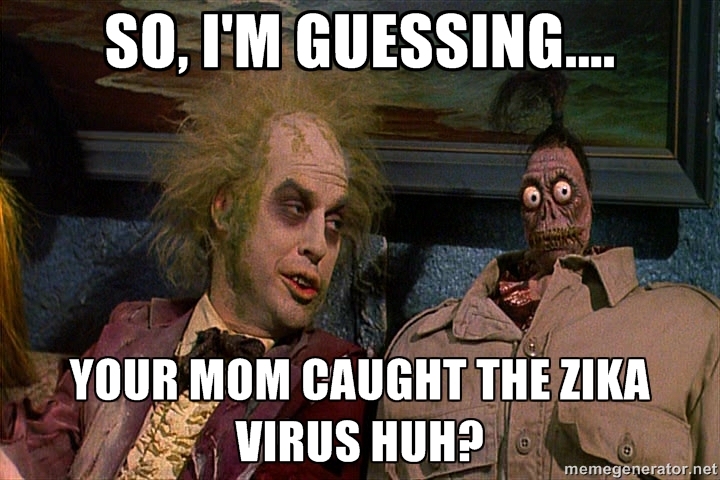It looks like you're using an Ad Blocker.
Please white-list or disable AboveTopSecret.com in your ad-blocking tool.
Thank you.
Some features of ATS will be disabled while you continue to use an ad-blocker.
share:
www.cnn.com...
Anyone that has read the book Hot Zone has been scarred from the thought of Ebola.
Here is what sounds insane to me. Why are they ushering these people to the some of the busiest airports for screening. They should be screened at the source. Maybe we shouldn’t even allow people to fly in from those areas.
How many times do we have to learn?
Ebola is a fast burn disease, so how does it make the biggest impact, get it around the most people….
CNN — All US-bound airline passengers who have been in Uganda in the 21 days before their arrival will be routed to one of five US airports for enhanced Ebola screening, the US Embassy in Uganda said Thursday. Starting at 11:59 p.m. ET Thursday, passengers will be routed to New York’s JFK airport; Liberty International Airport in Newark, New Jersey; Hartsfield-Jackson Atlanta International Airport; Chicago O’Hare International Airport; or Dulles International Airport in Washington, DC.
Anyone that has read the book Hot Zone has been scarred from the thought of Ebola.
Here is what sounds insane to me. Why are they ushering these people to the some of the busiest airports for screening. They should be screened at the source. Maybe we shouldn’t even allow people to fly in from those areas.
How many times do we have to learn?
Ebola is a fast burn disease, so how does it make the biggest impact, get it around the most people….
a reply to: JAGStorm
www.cnbc.com...
www.cnbc.com...
“Our primary focus now is to support the government Uganda now to rapidly control and contain this outbreak, to stop it from spreading to neighboring districts and neighboring countries,”
originally posted by: watchitburn
a reply to: JAGStorm
I gotta say. I was kinda disappointed when I opened this thread and it wasn't the EbolaMaps guy.
If they're so concerned they should stop flights coming from Africa.
No, wait, that would make sense. Therefore, they won't do it.
originally posted by: watchitburn
a reply to: JAGStorm
I gotta say. I was kinda disappointed when I opened this thread and it wasn't the EbolaMaps guy.
If they're so concerned they should stop flights coming from Africa.
That would be racist!
Hurt feelings more important than saving lives
Please you have to almost have direct contact with a sick person, no airborne transmission
www.cdc.gov...
www.cdc.gov...
Scientists think people are initially infected with Ebola virus through contact with an infected animal, such as a fruit bat or nonhuman primate. This is called a spillover event. After that, the virus spreads from person to person, potentially affecting a large number of people.
The virus spreads through direct contact (such as through broken skin or mucous membranes in the eyes, nose, or mouth) with:
Blood or body fluids (urine, saliva, sweat, feces, vomit, breast milk, amniotic fluid, and semen) of a person who is sick with or has died from Ebola virus disease (EVD).
Objects (such as clothes, bedding, needles, and medical equipment) contaminated with body fluids from a person who is sick with or has died from EVD.
Infected fruit bats or nonhuman primates (such as apes and monkeys).
Semen from a man who recovered from EVD (through oral, vaginal, or anal sex). The virus can remain in certain body fluids (including semen) of a patient who has recovered from EVD, even if they no longer have symptoms of severe illness. There is no evidence that Ebola can be spread through sex or other contact with vaginal fluids from a woman who has had Ebola.
When people become infected with Ebola, they do not start developing signs or symptoms right away. This period between exposure to an illness and having symptoms is known as the incubation period. A person can only spread Ebola to other people after they develop signs and symptoms of Ebola.
Additionally, Ebola virus is not known to be transmitted through food. However, in certain parts of the world, Ebola virus may spread through the handling and consumption of wild animal meat or hunted wild animals infected with Ebola. There is no evidence that mosquitoes or other insects can transmit Ebola virus.
Risk
Health workers who do not use proper infection control while caring for Ebola patients, and family and friends in close contact with Ebola patients, are at the highest risk of getting sick. Ebola can spread when people come into contact with infected blood or body fluids.
Ebola poses little risk to travelers or the general public who have not cared for or been in close contact (within 3 feet or 1 meter) with someone sick with Ebola.
Persistence of the virus
The virus can remain in areas of the body that are immunologically privileged sites after acute infection. These are sites where viruses and pathogens, like the Ebola virus, are shielded from the survivor’s immune system, even after being cleared elsewhere in the body. These areas include the testes, interior of the eyes, placenta, and central nervous system, particularly the cerebrospinal fluid. Whether the virus is present in these body parts and for how long varies by the survivor. Scientists are now studying how long the virus stays in these body fluids among Ebola survivors.
During an Ebola outbreak, the virus can spread quickly within healthcare settings (such as clinics or hospitals). Clinicians and other healthcare personnel providing care should use dedicated, preferably disposable, medical equipment. Proper cleaning and disposal of instruments such as needles and syringes are important. If instruments are not disposable, they must be sterilized before using again.
Ebola virus can survive on dry surfaces, like doorknobs and countertops for several hours; in body fluids like blood, the virus can survive up to several days at room temperature. Cleaning and disinfection should be performed using a hospital-grade disinfectant.
They just added an Ebola line item on ambulance software in NY.
Heads up
President ebola 2.0
Heads up
President ebola 2.0
originally posted by: watchitburn
a reply to: JAGStorm
I gotta say. I was kinda disappointed when I opened this thread and it wasn't the EbolaMaps guy.
I miss that guy every time the Olympics come around. I miss the old Olympics. Thanks for the memories, had these in the deepburgh archives.




Next up! Coming Soon!!

Don't catch it!
originally posted by: Mandroid7
They just added an Ebola line item on ambulance software in NY.
Heads up
President ebola 2.0
Tell me what this mean.
Does this mean that if they pick up a person with ebola they have to punch it in.
Also who the heck is picking up a person with Ebola??????
a reply to: JAGStorm
I had a thread running on the DRC outbreak that began in April of 2018 and was just declared over in Sept of 2022. The final mortality rate was 66%. That was the second biggest outbreak ever and the disease had managed to reach a major city of more than 1 million people that also had an international airport. It took 4 1/2 years to stop the outbreak using every agency and technique known for addressing such emergencies.
That was in the Democratic Republic of Congo where ebola is well known. An outbreak here would be a little different. The maximum incubation period is 21 days. That is three weeks a person could be infected before being diagnosed. One infected person in a well traveled public place in the US could be very bad, very fast. Lets hope we don't have to find out just how bad it can get.
I had a thread running on the DRC outbreak that began in April of 2018 and was just declared over in Sept of 2022. The final mortality rate was 66%. That was the second biggest outbreak ever and the disease had managed to reach a major city of more than 1 million people that also had an international airport. It took 4 1/2 years to stop the outbreak using every agency and technique known for addressing such emergencies.
That was in the Democratic Republic of Congo where ebola is well known. An outbreak here would be a little different. The maximum incubation period is 21 days. That is three weeks a person could be infected before being diagnosed. One infected person in a well traveled public place in the US could be very bad, very fast. Lets hope we don't have to find out just how bad it can get.
edit on 13-10-2022 by Vroomfondel because: (no reason
given)
a reply to: Vroomfondel
I've always had this sick feeling that China was over preparing for something much much worse than Covid.
They did the dress rehersal.
Look at all the countries around the world, who do you think would come out on top if Ebola was released into major cities?
I've always had this sick feeling that China was over preparing for something much much worse than Covid.
They did the dress rehersal.
Look at all the countries around the world, who do you think would come out on top if Ebola was released into major cities?
originally posted by: JAGStorm
a reply to: putnam6
Ebola poses little risk to travelers or the general public who have not cared for or been in close contact (within 3 feet or 1 meter) with someone sick with Ebola.
You mean like a super busy airport?
Really you think Ebola patients will be wandering through the concourses of America's airports? Ebola is damn near incapacitating when it is at its most infectious, it's why it's a problem in clinics and health care areas.
But as for dangers at an airport, I'm not sure it would even be in the top 100 seriously. Unless you run through an airport rubbing your mucous membranes everywhere you are gonna be fine JAG
The virus spreads through direct contact (such as through broken skin or mucous membranes in the eyes, nose, or mouth) with:
Blood or body fluids (urine, saliva, sweat, feces, vomit, breast milk, amniotic fluid, and semen) of a person who is sick with or has died from Ebola virus disease (EVD).
Objects (such as clothes, bedding, needles, and medical equipment) contaminated with body fluids from a person who is sick with or has died from EVD.
Infected fruit bats or nonhuman primates (such as apes and monkeys).
Semen from a man who recovered from EVD (through oral, vaginal, or anal sex). The virus can remain in certain body fluids (including semen) of a patient who has recovered from EVD, even if they no longer have symptoms of severe illness. There is no evidence that Ebola can be spread through sex or other contact with vaginal fluids from a woman who has had Ebola.When people become infected with Ebola, they do not start developing signs or symptoms right away.This period between exposure to an illness and having symptoms is known as the incubation period. A person can only spread Ebola to other people after they develop signs and symptoms of Ebola.
Additionally, Ebola virus is not known to be transmitted through food. However, in certain parts of the world, Ebola virus may spread through the handling and consumption of wild animal meat or hunted wild animals infected with Ebola. There is no evidence that mosquitoes or other insects can transmit Ebola virus.
edit on 13-10-2022 by putnam6 because: (no reason given)
originally posted by: JAGStorm
a reply to: Vroomfondel
I've always had this sick feeling that China was over preparing for something much much worse than Covid.
They did the dress rehersal.
It would seem that both China and Russia have their own agenda for our planet's future.
a reply to: JAGStorm
Yes, they are adding it to the list of things on pickup as far as I know, which I believe ties to procedure.
I will talk with the guy who wrote it and see what else I can figure out.
Maybe just innocent and being ahead of the game.
But then this nasally, whiney, nerdvert Gates voice plays in the back of my head.
"The next one is going to be bad!"
I'll drop by, or see if he'll drop by your thread shortly.
Yes, they are adding it to the list of things on pickup as far as I know, which I believe ties to procedure.
I will talk with the guy who wrote it and see what else I can figure out.
Maybe just innocent and being ahead of the game.
But then this nasally, whiney, nerdvert Gates voice plays in the back of my head.
"The next one is going to be bad!"
I'll drop by, or see if he'll drop by your thread shortly.
originally posted by: drewlander
a reply to: JAGStorm
Similar to covid, a more recent request came across my desk to code something special for ebola tracking in patient care reports. Thats all I can say at this time.
😲😭
The whole time Covid was going on I would tell my family, at least it's not Ebola....
new topics
-
My personal experiences and understanding of orbs
Aliens and UFOs: 11 hours ago
top topics
-
Matt Gaetz ready to go global thermonuclear
US Political Madness: 12 hours ago, 15 flags -
Smartest Man in the World Tells His Theory About What Happens At Death
Philosophy and Metaphysics: 16 hours ago, 11 flags -
My personal experiences and understanding of orbs
Aliens and UFOs: 11 hours ago, 5 flags -
NJ Drones just another Psy-Op
Dissecting Disinformation: 14 hours ago, 4 flags -
Research paper about plasmoids specifically calls out missing MH370 flight
General Conspiracies: 12 hours ago, 4 flags
active topics
-
and14263 New Account Not the Same Old Me
Introductions • 13 • : 320MPH -
Covid....... Again.
Diseases and Pandemics • 27 • : 320MPH -
Trump Cancel trip to New Jersey because of drones
Aliens and UFOs • 78 • : xuenchen -
Research paper about plasmoids specifically calls out missing MH370 flight
General Conspiracies • 1 • : Naftalin -
Smartest Man in the World Tells His Theory About What Happens At Death
Philosophy and Metaphysics • 33 • : andy06shake -
Light from Space Might Be Travelling Instantaneously
Space Exploration • 33 • : cooperton -
My personal experiences and understanding of orbs
Aliens and UFOs • 10 • : Naftalin -
US Federal Funding set to Expire December 20th. Massive CR on the way.
Mainstream News • 17 • : Skinnerbot -
Matt Gaetz ready to go global thermonuclear
US Political Madness • 12 • : TzarChasm -
Was Biden's Mass clemency and pardons one last cash grab?
US Political Madness • 11 • : network dude
